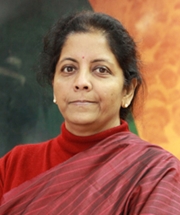India bends backwards; set to endorse WTO’s trade facilitation deal
04 Jan 2016
 In a reversal of its stance at the ministerial meeting of World Trade Organisation member countries at Nairobi, Kenya last month, the commerce ministry is now finalising a draft note endorsing the Trade Facilitation Agreement (TFA) that has already been endorsed by 63 member countries of the World Trade Organisation.
In a reversal of its stance at the ministerial meeting of World Trade Organisation member countries at Nairobi, Kenya last month, the commerce ministry is now finalising a draft note endorsing the Trade Facilitation Agreement (TFA) that has already been endorsed by 63 member countries of the World Trade Organisation.
India had earlier decided against endorsing the trade deal after the 2014 Bali ministerial meeting failed to address developing countries' concerns.
Now that the recently-concluded Nairobi ministerial has reaffirmed commitments to firm up the permanent solution to issues raised by India and several developing countries, India is expected to endorse the TFA, an official release stated.
The commerce ministry has drafted a note on the trade facilitation agreement (TFA) of the World Trade Organisation and will soon approach the cabinet for an approval, a senior government official said.
The TFA aims at easing customs rules and expediting the movement and clearance of goods and facilitating effective cooperation between appropriate authorities of countries concerned to facilitate trade.
The commerce ministry has received comments from various departments on a draft note circulated earlier. The ministry is in the process of finalising the note, factoring in the comments, which will then be placed before the cabinet, official sources said.
Meanwhile, in a bid to save face against criticism that India failed to protect its interests at the WTO, the government is planning to forge strong alliances on the ''development agenda'' of the WTO's ongoing Doha Round of the World Trade Organisation (WTO) negotiations to boost the trade prospects of the developing and poor nations. The government will, in the coming months, also hold a series of ''strategy workshops'' of stakeholders, inter-ministerial and centre-state discussions in addition to summits with African countries and other developing country groups, starting with a proposed visit by Prime Minister Narendra Modi to Africa in February.
There is widespread criticism from the opposition parties and civil society groups that the NDA government had failed to protect the interests of India and the developing world at the Nairobi ministerial held last month and gave way to developing country demands for an agreement to lower global trade barriers.
The TFA is projected to cut the cost of trade by an average of 14.5 per cent and the impact could be greater than elimination of all remaining tariffs, according to WTO director-general Roberto Azevêdo. It has the potential to raise global merchandise exports by up to $1 trillion a year, according to a recent WTO report.
The WTO got six more ratifications for the TFA at Nairobi ministerial, bringing up to 63 the number of its members that have formally accepted the pact.
However, the TFA can come into force only when two-thirds of the 162-odd WTO members formally accept the agreement. Myanmar, Norway, Vietnam, Brunei, Zambia and Ukraine are the latest to endorse the pact, which has already been ratified by several developed and developing countries, including the US, Japan, Australia, Korea and China.
Another WTO report suggests only 62 measures, aimed at facilitating trade, were initiated by the G20 nations, including India, between mid-May and mid-October, with a monthly average of just over 12, the slowest pace since November 2013. However, the G20 imposed 86 new trade-restrictive measures between mid-May and mid-October, the same pace at which the group had slapped curbs between mid-October 2014 and mid-May 2015.




















